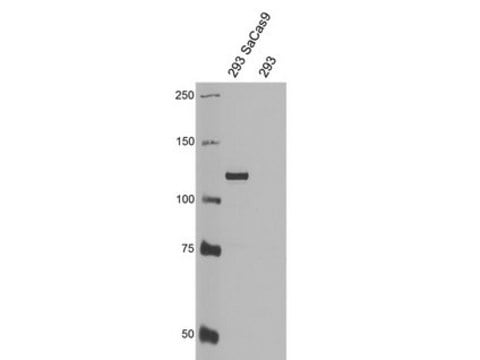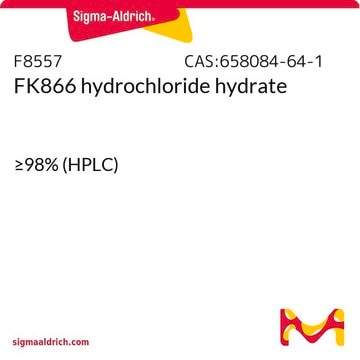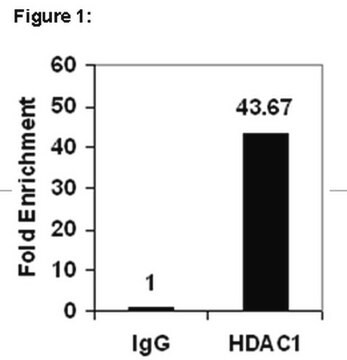AB356480
Anti-Cas9 (Rabbit Polyclonal)
serum, from rabbit
Szinonimák:
SaCas9, CRISPR-associated endonuclease Cas9
About This Item
WB
western blot: suitable
Javasolt termékek
biológiai forrás
rabbit
Minőségi szint
antitest forma
serum
antitest terméktípus
primary antibodies
klón
polyclonal
faj reaktivitás
Staphylococcus aureus, bacteria
kiszerelés
antibody small pack of 25 μL
technika/technikák
immunofluorescence: suitable
western blot: suitable
izotípus
IgG
UniProt elérési szám
kiszállítva
ambient
célzott transzláció utáni módosítás
unmodified
Általános leírás
Egyediség
Alkalmazás
Western Blotting Analysis: A 1:1,000 dilution from a representative lot detected Cas9 in HEK293 cells overexpressing fusion protein GFP-Cas9 (Courtesy of Dr. Gerry Shaw).
Minőség
Western Blotting Analysis: 0.2 µg/mL of this antibody detected Cas9 (Rabbit Polyclonal) in 40 µg of HEK293 cells overexpressing fusion protein GFP-Cas9 from Staphylococcus aureus.
Cél megnevezése
Egyéb megjegyzések
Nem találja a megfelelő terméket?
Próbálja ki a Termékválasztó eszköz. eszközt
Tárolási osztály kódja
12 - Non Combustible Liquids
WGK
WGK 1
Lobbanási pont (F)
Not applicable
Lobbanási pont (C)
Not applicable
Analitikai tanúsítványok (COA)
Analitikai tanúsítványok (COA) keresése a termék sarzs-/tételszámának megadásával. A sarzs- és tételszámok a termék címkéjén találhatók, a „Lot” vagy „Batch” szavak után.
Már rendelkezik ezzel a termékkel?
Az Ön által nemrégiben megvásárolt termékekre vonatkozó dokumentumokat a Dokumentumtárban találja.
Tudóscsoportunk valamennyi kutatási területen rendelkezik tapasztalattal, beleértve az élettudományt, az anyagtudományt, a kémiai szintézist, a kromatográfiát, az analitikát és még sok más területet.
Lépjen kapcsolatba a szaktanácsadással



![[1,1′-Bis(diphenylphosphino)ferrocene]dichloropalladium(II)](/deepweb/assets/sigmaaldrich/product/structures/130/734/8846aa26-1858-458a-998d-8c306c13bf0f/640/8846aa26-1858-458a-998d-8c306c13bf0f.png)




